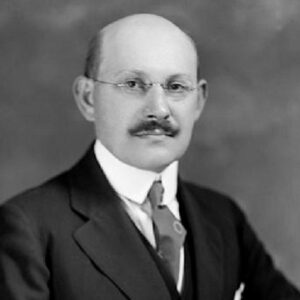Lafayette Mendel was an American biochemist who is credited with producing a groundbreaking nutritional discovery. He and Thomas B Osborne investigated the importance of vitamins and proteins in daily food as a means of maintaining a healthy lifestyle. They established amino acids and determined the necessity of a healthy diet by adding vitamin A, vitamin B, lysine, and tryptophan in the diet through their study and tests. They also pioneered current nutritional ideas. They discovered the negative consequences of a vitamin-deficient diet through their research. Did you know that a vitamin A deficit not only affects our daily nutritional needs, but also causes xerophthalmia, a disease caused by a lack of vitamin A? Mendel has always had a fascination with science, even since he was a child. Academically excellent, he was awarded a scholarship that allowed him to attend Yale University. After completing his studies, he returned to his alma university to serve as Sterling Professor in 1921. In his lifetime, he authored over 100 publications, each outlining his research and findings in the field of nutrition.
Childhood and Adolescence
Benedict Mendel and Pauline Ullman had Lafayette Mendel on February 5, 1872, in New York. His father worked in the business world as a merchant. His parents were both born in Germany. They arrived in the United States in the mid-nineteenth century.
Mendel received a New York State scholarship at the age of 15 after finishing his basic studies, which enabled him to get admission to Yale University. He studied classics, economics, and the humanities there. In addition, he studied biology and chemistry. He earned a bachelor’s degree with honors in 1891.
Mendel was awarded a fellowship shortly after graduation, which enabled him to begin his graduate studies at the Sheffield Scientific School. Russell Henry Chittenden, a physiologist at the Sheffield school, taught Mendel physiological chemistry.
Mendel successfully finished his Ph.D. in 1893. The research of the seed storage protein edestin isolated from hemp seed was the subject of his thesis.
The Career of Lafayette Mendel
Lafayette Mendel began his career as an assistant at the Sheffield School of Physiological Chemistry after completing his Ph.D. In the meantime, he relocated to Germany for a period of time to study various elements of physiological chemistry.
Mendel returned to Yale University in 1896 to take up a position as an Assistant Professor. In 1903, he was elevated to a full-time professor at the university. He became one of the first high-ranking Jewish academics in the United States as a result of this. In the meantime, he was offered positions at Yale School of Medicine and Yale Graduate School.
Mendel, along with Chittenden, was one of the founders of nutrition science at Yale University. To establish the necessary amino acids, he cooperated with Thomas B. Osborne, an American biochemist. The two looked into why rats couldn’t thrive on a diet consisting just of carbohydrates, lipids, and proteins.
Elmer McCollum and Marguerite Davis, American biochemists, discovered Vitamin A while Mendel and Osborne were identifying the necessary ingredients in a nutritious diet for rats.
Mendel and Osborne discovered in 1913 that butterfat contained vitamin A, while milk contained water-soluble vitamin B. Both vitamin A and vitamin B complex are required for a healthy lifestyle, according to the duo.
Mendel and Osborne’s research revealed the harmful consequences that a lack of these essential vitamins can have on our bodies. They discovered that a person who does not consume enough vitamin A-rich foods runs the risk of developing xerophthalmia.
Mendel and Osborne were also the first to recognize the relevance of lysine and tryptophan in a balanced diet. They also realized that the number of essential amino acids present in proteins determines their nutritional value.
Mendel and Osborne collaborated on almost 100 papers over their lifetime. ‘Changes in the Food Supply and Their Relation to Nutrition,’ he wrote in 1916. He later authored ‘Nutrition, the Chemistry of Life’ in 1923.
Mendel was named Sterling Professor of Physiological Chemistry in 1921. He was the only Jew among the twenty professors named Sterling professors, and he was the third in his class to be chosen for this coveted position.
Lafayette’s Major Projects
The most significant finding made by Mendel was on the subject of nutrition. Mendel, along with Thomas Osborne, pioneered current nutritional notions by emphasizing the need for Vitamin A, Vitamin B, lysine, and tryptophan in a balanced diet.
Achievements & Awards
Lafayette Mendel received various honors and distinctions during his lifetime. He founded the American Institute of Nutrition and served as its first President.
He was elected to the National Academy of Sciences in 1913.
The American Institute of Chemists awarded Mendel a gold medal in 1927 for his remarkable contributions to chemistry.
He was named Sterling Professor at Yale University in 1921.
For his excellent chemical contributions to medicine, he received the Conné Medal from the Chemist’s Club of New York in 1935.
Personal History and Legacy
On April 29, 1917, Lafayette Mendel married Alice R. Friend. The couple didn’t have any children.
After a protracted illness, he passed away on December 9, 1935, in New Haven, Connecticut, from cardiac disease.
His residence in New Haven was designated as a National Historic Landmark after his death.
Estimated Net worth
Unknown.


